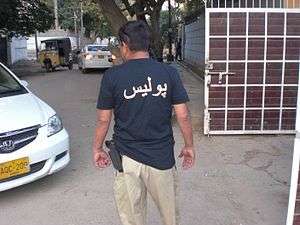Law enforcement in Pakistan
Law enforcement in Pakistan (Urdu: نفاذ قانون کے ادارے) is one of the three main components of the criminal justice system of Pakistan, alongside the courts and the prisons.[1][2] In Pakistan, law enforcement is jointly carried out by the federal and provincial police services and other law enforcement agencies who form a chain leading from investigation of suspected criminal activity to administration of criminal punishment.[3] The court system is vested with the power to make legal determinations regarding the conduct of the other two components.[2]


Primarily operated through the four provincial governments and the Islamabad Capital Territory, each police service has a jurisdiction extending only within the relevant province or territory.[4] Apart from investigating crime scenes, criminal acts, suspected unlawful activities, and detention of suspected criminals pending judicial action, the law enforcement agencies (primarily police) also perform duties that include the service and enforcement of warrants, writs, and other orders of the courts.[3] The law enforcement agencies are also involved in providing first response to emergencies and other threats to public safety as well as protecting the infrastructure and maintaining order in the country. At the federal level there are a number of law enforcement agencies including the Federal Investigation Agency, Federal Board of Revenue, Intelligence Bureau, Anti Narcotics Force, National Counter Terrorism Authority, the National Highways and Motorway Police and the Railways Police.[3] The four provinces each have their own police services such as the Punjab Police, Khyber Pakhtunkhwa Police, Sindh Police, Balochistan Police. The Khyber Pakhtunkhwa Police services are supported by paramilitary units such as the Frontier Constabulary and Frontier Corps.[3] Each police force has a Commissioner of Police appointed as Inspector-General who is the most senior officers from the Police Service of Pakistan— a component of the Central Superior Services of Pakistan.[5]
Designations of PSP officers

| Grade | Police Ranks | Directorial/Secretarial Appointment |
|---|---|---|
| BPS-17 |
|
|
| BPS-18 |
|
|
| BPS-19 |
|
|
| BPS-20 |
|
|
| BPS-21 |
|
|
| BPS-22 |
|
|
|
|
| |
See also
- List of law enforcement agencies in Pakistan
- Federal Security Force, a defunct law enforcement agency
- Paramilitary forces of Pakistan
- List of cases of law enforcement brutality in Pakistan
References
- Manzoor, Saima; Manzoor, Akif; Manzoor, Asif (2014). Police in Pakistan. U.S.: Lulu publications. ISBN 110599032X. Retrieved 5 March 2015.
- Hassan, Abbas (2011). "Reforming Pakistan's Police and Law Enforcement Infrastructure". www.usip.org/. U.S. Institute of Peace. Archived from the original (PDF) on 4 March 2016. Retrieved 5 March 2015.
- "Our Partners". National Police Bureau, Government of Pakistan. Archived from the original on 2012-01-18. Retrieved 2008-07-01.
- Abbas, Hassan. "Police Reforms in Pakistan" (PDF). ispu.org. Hassan Abbas, special report published by USIP. Archived from the original (PDF) on 2015-04-02. Retrieved 5 March 2015.
- Jones, Mark; Johnstone, Peter (2011). "Time Capsule: Policing in pakistan". History of Criminal Justice (google books). New York, U.S.: Routledge. ISBN 131752246X. Retrieved 5 March 2015.